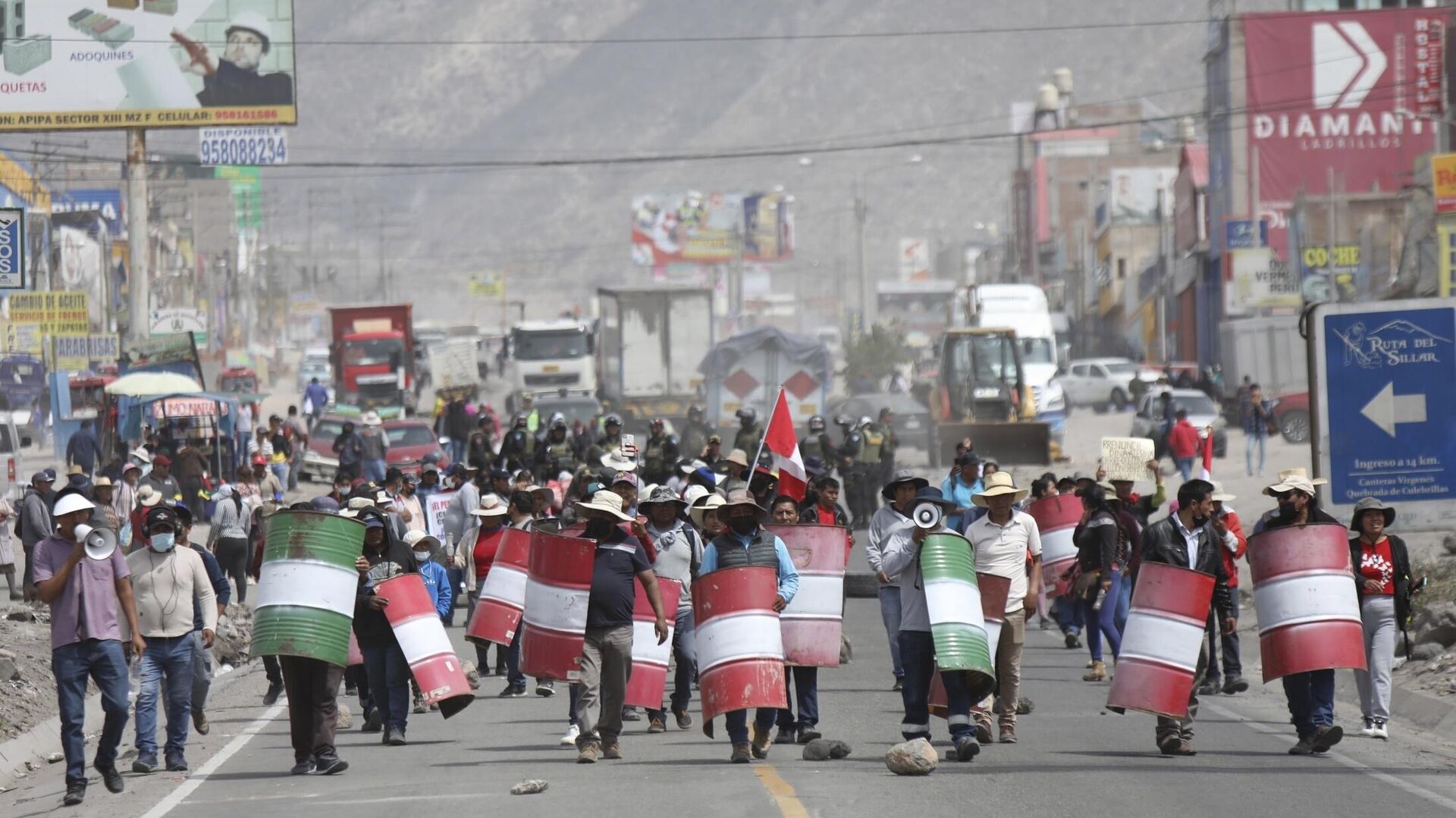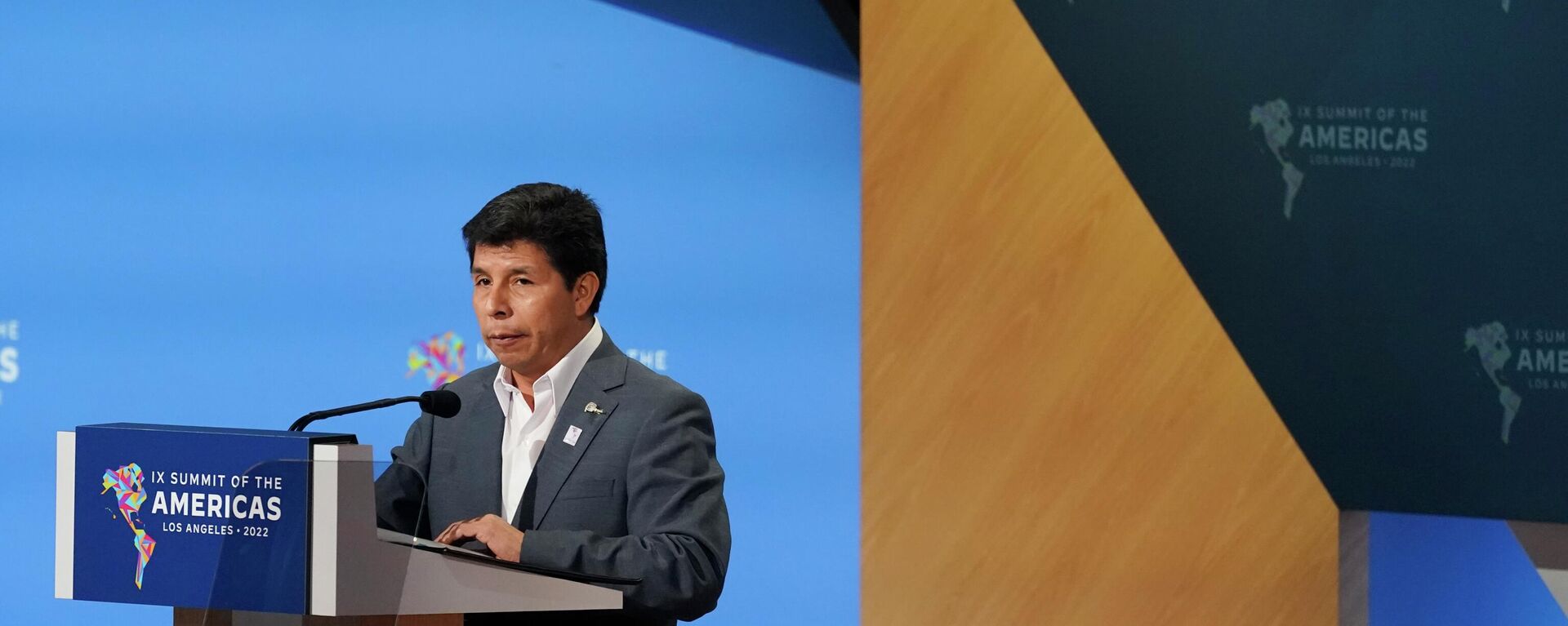Peru Mourns ‘Massacre’ of 17 as Calls Grow for US-Backed ‘Coup Regime’ to Step Down
23:52 GMT 10.01.2023 (Updated: 17:15 GMT 31.07.2023)

© AP Photo / Fredy Salcedo
Subscribe
A shockingly bloody day of violence threatened to upend the new coup-borne regime’s grip on power as Peruvians reacted with horror to the deadliest day so far in the political struggle that has rocked the country for over a month.
Thousands of Peruvians took to the streets throughout the country on Tuesday as memorial services were held in the city of Juliaca for the 17 people killed Monday in what victims families’ are calling a “massacre” by the Andean country’s security forces.
At least two of the deceased – a boy and a girl – were reportedly children. According to a health ministry official in the Puno region of Peru, another 68 victims suffered injuries in Monday’s violence.
Here’s the moment one anti-coup demonstrator in Peru was shot in cold blood today. 13 others met the same fate.
— Wyatt Reed (@wyattreed13) January 10, 2023
Don’t expect to hear the media demand sanctions or call for the “international community” to act, though — the US is backing the coup. https://t.co/1fZXShuLdd
Videos showing several of the killings circulated widely on social media Monday night, as condemnations rolled in from across the globe.
“In the name of the sacred right to life, of the rights of indigenous peoples recognized by UN and international organizations, in the name of peace and social justice, we demand that the massacre of our brothers in Perú stop,” wrote former Bolivian President Evo Morales, who was labeled ‘persona non grata’ and barred from entering the country just hours beforehand.
It was by far the deadliest day of the chaos that has wracked Peru since its first working-class indigenous president, Pedro Castillo, was overthrown last month. Castillo has been jailed ever since, following what leaders of countries throughout the region have condemned as a coup d’etat.
The head of the intensive care unit of the Carlos Monge Medrano Hospital in Juliaca, Jorge Sotomayor Perales, reportedly suggested that authorities used lethal expanding bullets in the bloody crackdown. In comments given to journalists Monday evening, Sotomayor noted the gunshot victims had “no exit wounds” but had “their internal organs destroyed.”
“I want to call on the central government – how can we have so many dead?” he asked.
Funeral homes in Juliaca, Peru, have donated coffins for those killed by the coup regime yesterday. A public memorial was held today. pic.twitter.com/AqjxZedOFT
— Kawsachun News (@KawsachunNews) January 10, 2023
On Tuesday, as the regional government began observing a three-day mourning period in honor of those killed, Prime Minister Alberto Otarola responded with an announcement of his own: a three-day nighttime curfew in Puno, extending from 8 p.m. local time until 4 a.m.
Without providing evidence, Otarola insisted in a news conference Monday night that “foreign interests” and “drug traffickers” were to blame for the killings. The former Defense Minister Otarola ascended to his current position just weeks ago and has emerged as one of the prime beneficiaries of the coup.
Observers point to his meeting with US Ambassador Lisa Kenna, just two days before Castillo was arrested, as evidence of US support for the putsch. After the coup’s consummation, the US Embassy immediately extended its recognition to the controversial regime, which imposed itself on Peru under the figurehead of self-styled ‘President’ Dina Boluarte.
As of publishing, Boluarte still had yet to comment on the spate of seemingly state-backed killings in Juliaca.
However, on Tuesday evening, Peru’s human rights office called on “all qualified institutions to investigate and punish those responsible for all the deaths that have occurred in the last hours in Juliaca.”
Hours beforehand, a representative for the Office of the UN High Commissioner for Human Rights said the international body was also “very concerned at the rising violence in Peru.”
In a statement urging the Boluarte regime to “comply with human rights standards and ensure that force is only used when strictly necessary,” and insisting “the rights to freedom of expression and of peaceful assembly must be respected and protected,” spokesperson Marta Hurtado noted that “one medical worker was killed while administering aid.”
The medical worker in question, Marco Antonio Samillan Sanga, was reportedly killed by the regime’s forces Monday while attempting to treat other victims.
In comments given to local media, his sister Milagros said that prior to his death, Sanga was on the verge of receiving his medical degree and dreamed of being “the best neurosurgeon in Juliaca.”
He was wearing his medical scrubs when he was killed while tending to the wounded “because of the goodwill and empathy that he had,” she said.
“How is it possible that they [give the] order to kill like that? How is it possible that President Dina Boluarte gives the order to kill whoever she wants?” she asked.
As Peruvians across the country awoke to the horrifying news, she was hardly the only one to demand answers.
On Tuesday, the Attorney General’s office announced it was opening an investigation into the role played by Boluarte and Otarola in the apparent state-sponsored massacre following a criminal complaint by Peruvian Congresswoman Ruth Luque, who wrote in the early hours that the “deaths cannot go unpunished.”


